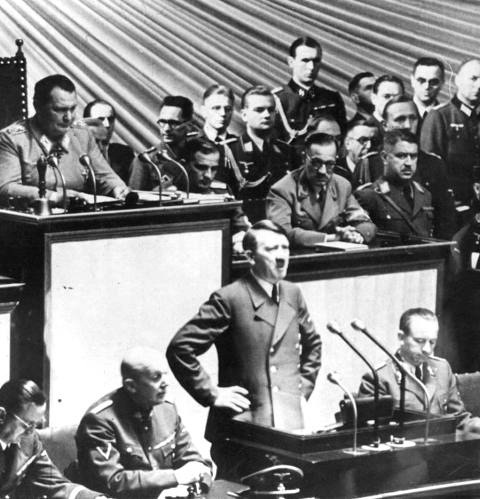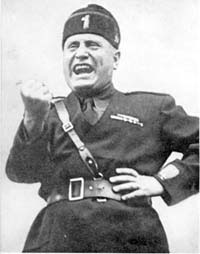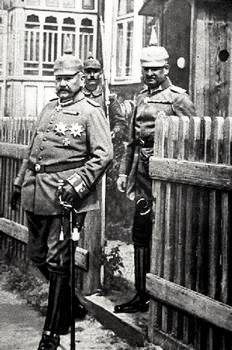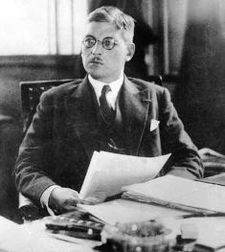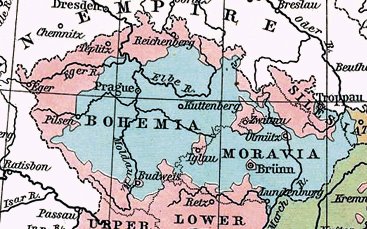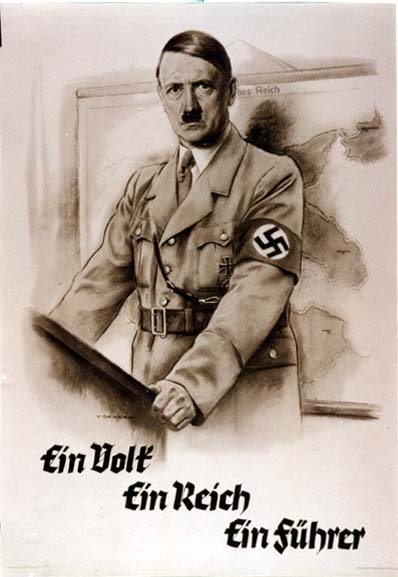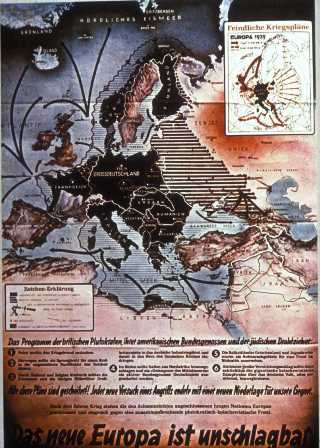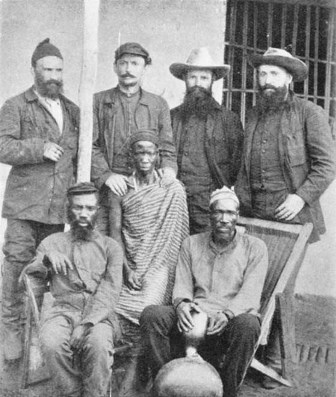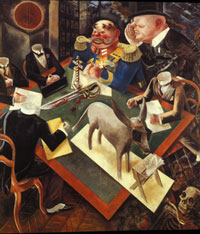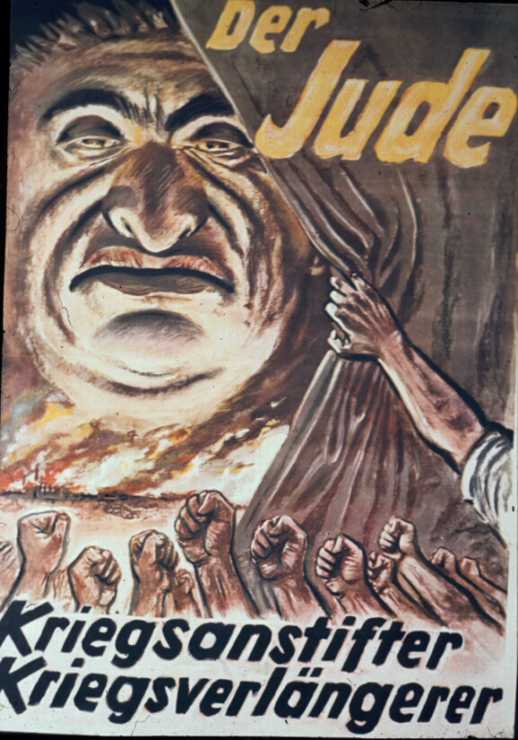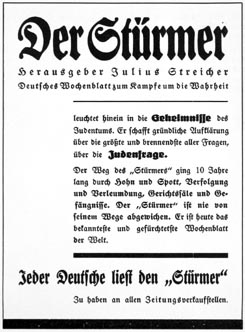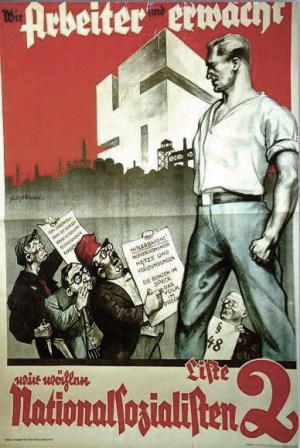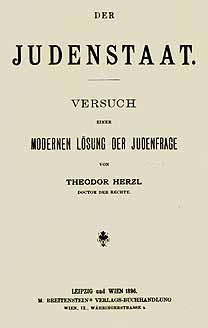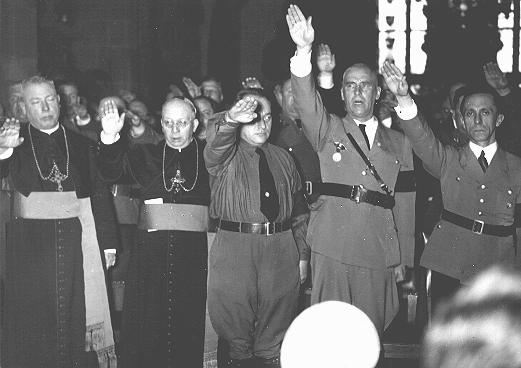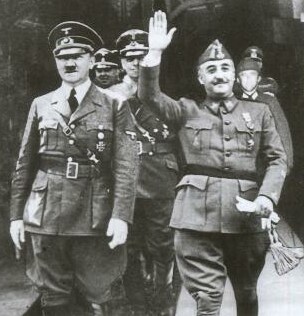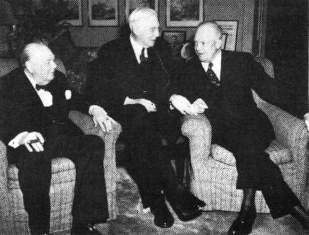Hitler Speaks to the Reichstag on the Jewish Question
Selected Extracts from Adolf Hitler's The Jewish Question speech, delivered before the Reichstag in Berlin, Germany - January 30, 1939.
[photos added to enhance the text] Deputies! Men of the German Reichstag!
When, six years ago this evening, tens of thousands of National Socialist fighters marched through the Brandenburg Gate to the light of their torches to express to me, who had just been appointed Chancellor of the Reich, their feeling of overwhelming joy and their vows as faithful followers countless anxious eyes all over Germany and in Berlin gazed upon the beginning of a development, the end of which still seemed unknown and unpredictable.
About 13 million Nazi voters were then behind me. A huge number - but only just over one third of all votes cast. Of course, the other 20 million was distributed and fragmented to approximately 35 other parties and factions. The only thing connecting them was common hatred against our young movement.
It united - as elsewhere still today - priests of the center and communist atheists, socialist demolishers of property and capitalist suitors of the stock market, monarchist advocates for the throne, and republican destroyers of the Reich.
They all had found each other in the long struggle of the national socialism for the leadership to defend their interests and were in cahoots with Jewry. The politicizing bishops of the various churches spread their blessing hands over it.
Opposite this only in the negative bonding fragmentation of the nation stood that third of faithful German men and women, who - against a world of internal and external opposition - embarked upon the recreation of the German Volk and Reich.
The overall picture of the size of the collapse at that time is beginning to fade.
But one thing remains unforgotten: It seemed that only a miracle in the twelfth hour could save Germany. We National Socialists believed in this miracle. Our opponents ridiculed our belief in it. The idea of redeeming the nation from a decline extending over fifteen years simply by the power of a new idea seemed to the non-National Socialists fantastic nonsense.
To the Jews and the other enemies of the State, however, it appeared to be the last flicker of the national power of resistance. And they felt that when it had disappeared, then they would be able to destroy not only Germany but all Europe as well. Had the German Reich sunk into Bolshevik chaos it would at that very moment have plunged the whole of Western civilization into a crisis of inconceivable magnitude. Only islanders with the most limited vision can imagine that the Red plague would have stopped of its own accord before the sacredness of the democratic idea or at the boundaries of disinterested States.
The rescue of Europe began at one end of the Continent with Mussolini and Fascism. National Socialism continued this rescue in another part of Europe and at the present moment we are witnessing in still a third country the same drama of a brave triumph over the Jewish international attempt to destroy European civilization.
Now, what are six years in the life of one man? What are they even in the lives of the peoples? One sees in such a short span of development little more than the symptoms of a general stagnation, a regression or a progress. But looking back, the last six years in Germany were filled with the most colossal events in German history.
On January 30, 1933, I moved into the Wilhelm Street filled with the deepest anxiety for the future of my people. Today, six years later, I am able to speak before the first Reichstag of Great Germany! We are, indeed, perhaps better able than other generations to realize the full meaning of those pious words: "What a change by the grace of God."
Six years is enough to fulfill the dream of centuries; one year to bring our people in the pleasure of that unity which was the unsuccessful aim of many generations.
As I today see you assembled before me as the representatives of our German people from all over the Reich and know that among you are the newly elected men of the Ostmark [Austria] and the Sudetenland I am once more overwhelmed by tremendous impressions of the events of a year which realized the dream of centuries.
How much blood has been shed in vain for this goal! How many million Germans have consciously or unconsciously trodden the bitter path to sudden or painful death for the sake of this ideal! How many others have been condemned to drag out behind the walls of fortresses and prisons lives they would gladly have given for Great Germany! How many hundreds of thousands have been scattered over the wide world by the endless stream of German emigration, driven by misery and want! For many a year they still think of their unfortunate homeland, but as generations go by they forget it. And now in a single year it has been possible to realize this dream.
Not without a fight, as unthinking citizens to maintain this might think. Prior to this year of German unification we had almost two decades of struggle for a fanatical political idea.
Hundreds of thousands and millions threw themselves into it, their physical and economic existence; they took ridicule just as willing as years of shameful treatment, pathetic slander, and unbearable terror. Numerous blood-covered dead and injured all over Germany are witnesses of the fight. Moreover, this success was won through an immense effort of will and by force of brave and fanatical endured decisions. I mention this because there is a chance that precisely those who had the least practical part in the success of Germany's unification, cheekily claim the act of creation of this Reich as their doing. Or they might view the events of the year 1938 as a long overdue but unfortunately delayed matter of course which was finally brought about by National Socialism.
To these elements I would like assure that the enforcement of this year took a nerve-force of which these goblins not even possess a hint! These are the well known old incorrigible pessimists, skeptics, or apathetics, which were always absent as positive elements in all of our twenty years of struggle, but who now - after the victory - think they have to deliver their critical comments as called experts of the national exaltation.
I will now in a few sentences give you the facts of the historical events of the memorable year 1938. Among the fourteen points which President Wilson promised Germany in the name of all the Allies as the basis on which a new world peace was to be established when Germany laid down her arms was the fundamental principle of the self-determination of peoples. The proclamation of this principle might have been of fundamental importance. Actually during the following period the Allied Powers of the day also applied these theories when they could make them serve their own selfish purposes. Thus they refuse to return Germany's colonial possessions, alleging that it would be wrong to return the native inhabitants of the colonies to Germany against their will.
But, of course, in 1918 no one took the trouble to find out what their will was. But while the Allies thus upheld the right of self-determination for primitive Negro tribes, they refused in 1918 to grant to a highly civilized nation like the Germans the rights of man which had previously been solemnly promised to them. All efforts to bring about a change in the situation to normal methods of reasonable revision have hitherto failed, and are bound to fail in the future, in view of the well-known attitude of the Versailles powers. Indeed, all the articles dealing with revision in the Covenant of the League of Nations had only a platonic significance.
I myself, as a son of the Ostmark, was filled with a sacred wish to solve this problem and thus lead my homeland back to the Reich. In January, 1938, I finally resolved that in the course of that year, in one way or another, I would fight for and win the right of self-determination for the 6,500,000 Germans in Austria.
1. I invited Herr Schuschnigg, then Chancellor of Austria, to an interview at Berchtesgaden and made it clear to him that the German Reich would no longer inactively tolerate any further oppression of these German comrades, and that I would therefore leave it up to him to come up with a sensible agreement in order to solve this problem once and for all. I didn't leave any doubt about the fact that otherwise the freedom of these 6,500,000 Germans would be enforced by other means. The result was an agreement which permitted me to hope for a solution of this difficult problem by means of a general understanding. 2. In my Reichstag speech of February 20, I stated that the Reich could no longer be indifferent to the fate of the 10,000,000 Germans in Central Europe who were separated from the motherland against their will. I stated that further oppression and mistreatment of these Germans would lead to the most energetic counter measures.
A few days later, Herr Schuschnigg decided to violate in a glaring manner the agreement which he had entered into at Berchtesgaden. His idea was by means of a faked plebiscite to destroy the legal basis of the national right of self-determination and the will of these 6,500,000 Germans. On the evening of Wednesday, March 9, I learned of this intention through Schuschnigg's speech at Innsbruck. That night I ordered the mobilization of a certain number of infantry and mechanized divisions with orders to cross the frontier on Saturday, March 12, at 8 A.M. in order to liberate the Ostmark. On the morning of Friday, March 11, the mobilization of these army and SS units was completed. They took up their positions during the course of the day. Meanwhile in the afternoon, due to the pressure of all the events and the rising of the citizens in the Ostmark, Schuschnigg resigned.
On Friday night I was asked to order the German troops to march into Austria to prevent grave internal disorders in that country. Toward 10 P.M. troops were already crossing the frontier at numerous points. At 6 A.M. the next morning the main body began to march in. They were greeted with tremendous enthusiasm by the population which was thus at last free.
On Sunday, March 13, I ordered in Linz by means of the two laws with which you are familiar, the integration of the Ostmark into the German Reich and the swearing in of the former federal army with me as the commander in chief. Two days later the first parades of the troops took place in Vienna. All this took place very rapidly. The confidence in the speed and the efficiency of the new German Wehrmacht was not disappointed but maybe surpassed. The belief in the great value of this fine instrument was confirmed within a few days.
The first election to the Greater German Reichstag, which took place on April 10, expressed the overwhelming approval of the German nation. About 99 of 100 gave their vote in approval.
A few weeks later, influenced by the international campaign of hate carried on by certain newspapers and individual politicians, Czechoslovakia began an intensified oppression of the Germans within her borders.
Close upon 3,500,000 of our fellow-countrymen lived there in self-contained settlements which for the most part adjoined the boundaries of the Reich. Together with the Germans who were driven out during twenty odd years by the Czech reign of terror, this makes a total of over 4,000,000 persons who were retained in this State against their will and were ill-treated to a greater or less degree. No world power with any sense of honor would have watched such a state of affairs permanently. The man responsible for this development which gradually made Czechoslovakia the exponent of all hostile intentions directed against the Reich, was Dr. Benes.
Despite a declaration twice given to the Czechoslovakian President, Dr. Benes, in my name, that Germany had not mobilized a single solider, despite the same assurances that it was possible to make to representatives of foreign powers, the fiction was maintained and disseminated that Czechoslovakia for her part had been forced to mobilize in consequence of the German mobilization and that Germany had thus had to countermand her own mobilization and to renounce her plans. . . .
I resolved to solve, once and for all, and this radically, the Sudeten German question. On May 28, I ordered:
1. That preparations should be made for military action against this State by October 2;
2. That the construction of our western defenses should be greatly extended and speeded up.
For the dispute with Mr. Benes and in order to protect the Reich from other influences or even threats the immediate mobilization of ninety-six divisions was planned to begin with and arrangements were made whereby these could be supplemented in a short time by a larger number.
Developments late in the summer and the plight of the Germans in Czechoslovakia showed that these preparations were justified. The various stages of the final settlement of this problem are a matter of history.
If certain newspapers and politicians in the rest of the world now allege that Germany thus threatened other nations by military blackmail it can only be as a result of crude distortion of the facts. Germany restored the rights of self-determination to 10,000,000 of her fellow-countrymen in a territory where neither the British nor any other Western nation have any business. It has not threaten anyone, it has only been a defense against the attempted interference of third parties.
And I need not assure you gentlemen that in the future as well we shall not tolerate the Western States' attempting to interfere in certain matters which concern nobody but ourselves in order to hinder natural and reasonable solutions by their intervention.
We were all happy therefore when, thanks to the initiative of our good friend, Benito Mussolini, and thanks also to the highly appreciated readiness of Mr. Chamberlain and M. Daladier, it became possible to find the elements of an agreement which not only allowed of the peaceful settlement of a matter which admitted no further delay but could moreover be looked upon as an example of the possibility of a general and sensible treatment and settlement of certain vital problems. However, if it weren't for the resolution to solve this problem either way, the European powers wouldn't have come together.
[...]
This unique event in the history of our nation represents for you, gentlemen, a sacred and everlasting obligation. You are not the deputies of a district or of a certain side, you are not the representatives of particular interests, but you are, first of all, the chosen delegates of the whole German nation. You are thus guarantors of that German Reich which National Socialism has made possible and created. You are therefore in duty bound to serve with the deepest loyalty the movement which paved the way for and realized the miracle of German history in the year 1938. In you must be incorporated in the most superlative form the virtues of the National Socialist party — loyalty, comradeship and obedience.
[...]
The history of the last thirty years has taught us all one great lesson, namely, that the importance of nations in the world is proportionate to their strength at home. The number and value of a population determines the importance of a nation as a whole. The final decisive part played in the valuation of the real strength of a nation will always be found in the state of its internal order; that is, the organization of its national strength.
The German of today is no different from that of ten, twenty or thirty years ago. Since then the number of Germans has not increased to any considerable extent. The capabilities of genius and energy cannot be considered more plentiful than in former times. The one thing which has changed considerably is the way in which these values are utilized to the full by the manner of their organization, and thanks to the formation of a new method of the selection of the leaders.
[...]
Gentlemen, we are faced with enormous and stupendous tasks. A new history of the leadership of our nation must be constructed. Its composition is dependent on race. It is, however, just as necessary to demand and make sure through the system and method of our education that above all bravery and the readiness to accept responsibility will be regarded as essential qualities in those about to assume public office of any kind.
When appointing men to leading positions in the State and party, greater value should be placed on character than on purely academic or allegedly intellectual suitability. It is not abstract knowledge which must be considered as a decisive factor wherever a leader is required but rather a natural talent for leadership, and with it a highly developed sense of responsibility which brings with it determination, courage and endurance. It must be recognized on principle that the lack of a sense of responsibility can never be made up for by a supposedly first-class academic training, of which certificates may supply the fruit. Knowledge and qualities of leadership, which always imply energy, are not incompatible. But in doubtful cases knowledge can in no circumstances be a substitute for integrity, courage, bravery and determination. These are the qualities that are more important in a leader of the people in the State and party.
And I say this to you now, gentlemen, looking back on the one year in German history which has shown me more clearly than the whole of my previous life how vital and essential these very qualities are; and how in time of crisis one single energetic man of action outweighs ten feeble intellectuals. But as a factor in society this new type, selected as embodying the qualities of leadership, must also be freed from numerous prejudices which I can really only describe as the untruthful and fundamentally nonsensical code of social morals. There is no attitude which cannot find its ultimate justification in the benefit which it brings to the community as a whole.
Anything that is obviously unimportant or even harmful to the existence of the community is not to be recognized as a moral code on which a social order can be built up. And most important of all, the national community is possible only when laws are recognized which are binding for all. It will not do to expect or demand that one man should act in accordance with principles which in the eyes of the others are absurd or harmful or even just unimportant. I fail to appreciate the efforts of social classes, which are dying out, to cut themselves off from real life and keep themselves artificially alive behind a hedge of dry, outlived class laws.
[...]
So long as the idea is only to secure a peaceful burial place there is no objection. But if this is an attempt to place a barrier in the way of life's progressive march then the windstorm of youth will clear away the whole tangled growth in its downward sweep. In the German State of today, the people's State, there are no social prejudices. And consequently there is no special social code of morals. This State recognizes only the laws of life and the necessities at which man has arrived through reason and insight. National Socialism recognizes these laws of necessity and it is one of the concerns of National Socialism to have them respected.
[...]
Gentlemen, we live in an age when the air is full of the cries of democratic defenders of morals and world reformers. Judging from the statements of these apostles one might almost conclude that the whole world is only waiting its chance to redeem the German nation from its unhappy plight, to lead it back to the blessed state of cosmopolitan brotherhood and mutual assistance in international affairs which were Germans were so thoroughly able to test during the fifteen years before the National Socialist assumption of power.
Speeches and newspapers in these democracies tell us every day about the difficulties we Germans face. One difference is to be noted between the speeches of the statesmen and the leading articles of their journalists. The statesmen either pity us or else unctuously praise the tried recipes — which unfortunately, however, do not seem to be so successful in their own countries; the journalists on the other hand give expression to their true sentiments somewhat more candidly. They inform us confidently and with a feeling of malicious pleasure that we are either suffering a famine or that one is — God wiling — about to descend upon us, that we are facing ruin as the result of a financial crisis, or else a production crisis or — if even that should not come to pass — a consumption crisis.
The only thing is that the sagacity of these democratic world economic scholars, of which we have so much concrete proof, does not always produce quite uniform diagnosis. During the past week alone, in view of the increased concentration of German self-assertiveness, one could read at the same time:
1. That although Germany had a surplus of production she would succumb as a result of the lack of consumption power;
2. Although there was a huge consumers' demand, the shortage of production goods alone would bring the country to ruin;
3. That we should certainly collapse under the terrific burden of our debts;
4. That we wanted no debts, but by National Socialist policy in this field too we were acting contrary to the last sacred capitalist ideas, and consequently — please God — would ruin ourselves;
5. That the German people were in revolt on account of the low standard of living;
6. That the State could no longer maintain the high standard of living of the German people — and so on.
All these and many similar theses of these democratic world economic dogmatists had their forerunners in countless statements made during the period of the National Socialist struggle and in particular during the last six years. In all these laments and prophecies there is only one sincere strain, and that is the single honest democratic wish that the German people, and particularly the National Socialist Germany of today, should finally perish.
[...]
What is the root cause of all our economic difficulties? It is the overpopulation of our territory. And in this connection there is only one fact and one question which I can hold up to the Western and the extra-European democracies.
The fact is this: In Germany there are 135 people to the square kilometer, living entirely without their former reserve; for fifteen years a prey to all the rest of the world, burdened with tremendous debts, without colonies, but the German people are nevertheless fed and clothed, and, moreover, there are no unemployed among them.
While the question is this: Which of the so-called great democracies is capable of performing the same feat? If we chose particular methods, the reason was simply that we were forced intro particular circumstances. And in fact, our position was so difficult that there can be no possible comparison with the position of the other great States. There are countries in the world where instead of 135 people to the square kilometer, as there are in Germany, there are only between five and eleven, where vast stretches of fertile land lie fallow, where all imaginable minerals are available. There are countries which have all this and the natural wealth of coal, iron and ore and yet are not even capable of solving their own social problems, of doing away with unemployment or overcoming their other difficulties.
And now the representatives of these States swear by the wonderful qualities of their democracy. They are quite at liberty to do so as far as they are concerned. But as long as we still had an offshoot of this democracy in Germany we had 7,000,000 unemployed; trade and industry were faced with absolute ruin in town and country, and society was on the point of revolution. Now we have solved these problems in spite of our difficulties, and for this we have our regime and our internal organization to thank. The representatives of foreign democracies marvel that we now take the liberty of maintaining that our regime is better than the former one; above all they marvel that the German people acquiesce in the present regime and reject the former.
But, after all, does not a regime which has the support of 99 per cent of the people represent quite a different kind of democracy from the solution which in some countries is possible only with the help of extremely doubtful methods of influencing election results? And above all, what is the meaning of this attempt to foist something onto us which — insofar as it is a question of government by the people — we already possess in a much clearer and better form? But as for the method that is so much recommended, it has proved absolutely useless in our country.
In those other countries it is maintained that collaboration should be possible between democracies and what they term dictatorships. And what might that mean? The question of the form of government or of the organization of the national community is not a subject for international debate at all. It is a matter of absolute indifference to us in Germany what form of government other nations have. At the most, it is a matter of indifference to us whether National Socialism — which is our copyright, just as fascism is the Italian one — is exported or not. We are not in the least interested in this ourselves! We see no advantage in making shipments of National Socialism as an idea, nor do we feel that we have any occasion to make war on other people because they are democrats.
The assertion that National Socialism in Germany will soon attack North or South America, Australia, China, or even the Netherlands, because different systems of government are in control in these places, is on the same plane as the statement that we intend to follow it up with an immediate occupation of the full moon.
[...]
If certain methods of our economic policy appear injurious to the rest of the world, it should recognize that a hatred on the part of the former victor States, which was irrational and purposeless from an economic point of view, was chiefly responsible for making these efforts necessary. On this occasion again, as so often before, I wish to make clear in a few words to you, gentlemen, and thus to the entire German people, an existing situation which we must either accept or alter.
Before the war Germany was a flourishing economic power. She participated in international trade and observed the economic laws which had general validity at that time as well as the methods of that trade. I need say nothing here with regard to the compulsion to participate in this trade activity since it is presumptuous to assume that God created the world only for one or two peoples. Every people has the right to ensure its existence on this earth.
The German people is one of the oldest civilized peoples of Europe. Its contribution to civilization is not based on a few phrases of politicians but on immortal achievements which have been of positive benefit to the world. It has exactly the same right as any other people to share in the opening up and development of the world. Nevertheless, even in pre-war years, English circles upheld the idea — which was utterly childish from an economic point of view — that the destruction of Germany would tremendously increase British profits from trade. In addition, there was the further fact that even then the Germany of that day was believed to be in the final analysis a not entirely amenable factor with regard to the domination of the world which the Jews were attempting to establish.
Consequently, from this side all available means were utilized to incite to an attack upon Germany. The war in which Germany found herself involved, purely as a result of a mistaken interpretation of loyalty to an ally, ended after over four years with that fantastic proclamation of the famous American President Wilson. These fourteen points, which were then supplemented by four additional ones, represent the solemn commitments of the Allied powers, on the basis of which Germany laid down her arms. After the Armistice these undertakings were broken in the most infamous manner.
There then began the insane efforts of the victor States to transform the sufferings of the war into a permanent state of warfare during times of peace. For the most part an end has been put to this condition today. This has not happened because the democratic statesmen have displayed insight or even merely a sense of equity but solely through the strength of the reawakened German nation.
It is in any case a fact that at the end of the war any rational considerations would have shown that no State had visibly profited. The clever British writers of economic articles, who had formerly written that destruction of Germany would increase the wealth of every individual Englishman and benefit the welfare of their country, were forced — at least for a certain period, when reality too clearly showed the untruth of their statements — to remain silent. Similar brilliant discoveries have begun to crop up again in the speeches of British politicians and the leading articles of the same type of newspaper writers during the past few months. What was the war fought for? In order to destroy German sea power, which then occupied second place.
[...]
From the banks of the Pacific Ocean in the Far East to the waters of the North Sea and the coast of the Mediterranean, other forms of government are spreading with great rapidity. Any benefits one can possibly imagine from this war have been completely canceled, not merely by the tremendous sacrifices of human lives and goods but also by the continuing burden on all production, and above all on the budgets of the States. This, however, was a fact which was evident and could be seem immediately after the war. If it had been taken into consideration, the peace treaties would certainly have been drawn up on a different basis.
For example, proof for all time to come of an extraordinarily limited insight in judging economic possibilities was furnished by the sums proposed in the years 1919 and 1920 as possible reparations payments. They are so far beyond the bounds of any economic reason that one can only assume a general desire for world destruction as the sole intelligible cause for this procedure, which otherwise can only be characterized as insanity.
[...]
But this was not all: in order to prevent or hamper any autarchic activity by Germany, the Reich was even deprived of its own colonial possessions which had been acquired by purchases and treaty. This means that the strongest people of Central Europe was forced through a series of truly brilliant maneuvers to work much harder than before as an exporting nation regardless of cost. For German exports had to be large enough not only to satisfy German requirements, but also to provide additional insanely high reparations, which, of course, meant that, in order to pay 1 mark, 3 or 4 marks' worth of goods had to be exported, since in the long run these gigantic sums could only be paid from profits and not from capital. Since Germany was not in a position to fulfill these obligations the victor nations by means of loans subsidized German trade competition on the world market, after ten or twelve million men had given their lives on the battlefield to eliminate the trade enemy from the world market.
I will only mention parenthetically that this insane procedure finally led to exaggerated developments and in the end upset all national economies and caused serious currency crises. The entire conduct of the so-called victor powers after the end of the war was completely irrational and irresponsible. The theft of the German colonies was morally an injustice. Economically it was utter insanity! The political motives advanced were so mean that one is tempted merely to call them silly.
[...]
In actual fact the problem at the end of the war had become still more critical than it was before the war. Quite briefly, the problem was as follows:
How can a just and sensible share in the world's wealth be assured to all great nations? For surely no one can seriously assume that, as in the case of Germany, a mass of 80,000,000 intelligent persons, can be permanently condemned as pariahs, or be forced to remain passive forever by having some ridiculous legal title, based solely on former acts of force, held up before them. And this is true not only of Germany but of all nations in a similar position, for it is quite clear that: either the wealth of the world is divided by force, in which case this division will be corrected from time to time by force, or else the division is based on the ground of equity and therefore, also, of common sense, in which case equity and common sense must also really serve the cause of justice and ultimately of expedience.
But to assume that God has permitted some nations first to acquire a world by force and then to defend this robbery with moralizing theories is perhaps comforting and above all comfortable for the 'haves,' but not for the 'have-nots.' It is just as unimportant as it is uninteresting and lays no obligation upon them. Nor is the problem solved by the fact that a most important statesman simply declares with a scornful grin that there are nations which are 'haves' and that the others on that account must always be 'have-nots.'
[...]
As far as Germany is concerned the situation is very simple. The Reich has 80,000,000 inhabitants; that means over fifteen persons to the square kilometer. The great German colonial possessions, which the Reich once acquired peacefully by treaties and by paying for them, have been stolen — contrary indeed to the solemn assurance given by President Wilson, which was the basic condition on which Germany laid down her arms.
The objection that these colonial possessions are of no importance in any case should only lead to their being returned to us with an easy mind. But the objection that this is not possible because Germany would not know what to do with them since she did not do anything with them before is ridiculous. Germany, which was late in acquiring her colonial possessions, was able to develop them in a relatively short time and before the war was not faced by the same acute needs as today. This objection is consequently just as foolish as if anybody were to question a nation's capacity to build a railway because it had no railway 100 years ago.
The further objection that her colonial possessions cannot be returned to her because Germany would thus acquire a strategic position is a monstrous attempt to deny general rights to a nation and a people a priori. For this can be the only answer: Germany was in any case the only State which set up no colonial army since she trusted to the terms of the Congo Act which were afterward broken by the Allies.
Germany does not require her colonial possessions at all in order to set up armies there — she has a sufficiently large German population for this purpose at home — but to relieve her economic difficulties. But even if this be not believed, it is wholly immaterial and in no way affects our rights. Such an objection would only be justified if the rest of the world wished to give up its military bases and were only forced to maintain them if Germany were to be given back her colonies. The fact remains that a nation of 80,000,000 will not be willing permanently to be assessed differently from other nations.
The fallacy and poverty of these arguments clearly show that at bottom it is only a question of power, in which common sense and justice receive no consideration from the common standpoint of view. The very reason which could once be advanced against taking Germany's colonies from her can be used today for their return.
As she lacks a sphere of economic development for herself, Germany is forced to satisfy her own requirements by an increasing participation in world trade and in exchanges of goods. For on one point those very nations must be agreed, which themselves have immense economic possibilities at their disposal, either because they themselves occupy large territories or because they have great additional colonial possessions — namely, that the economic existence of a nation cannot be maintained without a sufficient supply of foodstuffs or without independent raw materials. If both are lacking a nation is forced to participate in world trade under all circumstances and perhaps to an extent which may even be undesirable to other countries. Only a few years ago, when conditions forced Germany to adopt her Four-Year Plan, we could to our great astonishment hear from the lips of British politicians and statesmen the reproach — which at that time sounded so sincere — that Germany was withdrawing from the sphere of international economics, even from world economic contacts, and was thus retiring into regrettable isolation.
I replied to Mr. Eden that this apprehension was perhaps a little exaggerated and if it was meant at all sincerely was not admissible. Conditions today make it quite impossible for Germany to withdraw from world trade. The simply compel us by the mere force of necessity to participate in it under all circumstances even when the form of our participation perhaps does not suit one country or another. . . .
If certain countries combat the German system this is done in the first instance because through this German method of trading the tricks of international currency and Bourse speculations have been abolished in favor of honest business transactions. Germany, moreover, does not force her trading methods upon anybody else, but neither does she let any parliamentary democrat lecture her on the principles on which she shall or may act. We are buyers of good foodstuffs and raw materials and suppliers of equally good commodities! It is clear that everything which an economic system cannot produce in the territory in which its own currency circulates can only be imported by an increased turnover in exports. But since, as I have already emphasized, a nation which has an insufficient freedom of movement economically is imperatively forced to import foreign raw materials and foodstuffs, its economic system by doing so is acting under the most imperious force which exists, namely, the force of necessity!
[...]
If ever need makes humans see clearly it has made the German people do so. Under the compulsion of this need we have learned in the first place to take full account of the most essential capital of a nation, namely, its capacity to work. All thoughts of gold reserve and foreign exchange fade before the industry and efficiency of well-planned national productive resources. We can smile today at an age when economists were seriously of the opinion that the value of currency was determined by the reserves in gold and foreign exchange lying in the vaults of the national banks and, above all, was guaranteed by them. Instead of that we have learned to realize that the value of a currency lies in a nation's power of production, that an increasing volume of production sustains a currency, and could possibly raise its value, whereas a decreasing production must, sooner or later, lead to a compulsory devaluation. [...]"
At one point, however, nature sets the limit to any further intensification of effort. That means, if some change does not take place, that German consumption power would find its natural limitation in the maximum of production of food supplies. The situation which would then arise could only be overcome in two ways:
First, by means of additional imports of foodstuffs and increased exports of German products, which would necessitate the importation of at least some of the raw materials necessary for their manufacture, with the result that only a proportion of imports received would be available for the purchase of foodstuffs, or,
Second, the extension of our nation's living space so that in our domestic economy the problem of Germany's food supplies can be solved.
As the second solution is for the time being not yet feasible, by reason of the continued blindness of the one-time victorious powers, we are forced to occupy ourselves with the first; in other words, we have to export in order to buy foodstuffs and, moreover, as these exports require raw materials, all of which we do not possess, we are forced to export still more in order to assure ourselves of these extra raw materials. This necessity is consequently not of a capitalistic kind, as perhaps may be the case in other countries, but arises out of the uttermost need a nation can meet with, namely, the need for its daily bread. And when in this matter statesmen of other countries threaten us with I do not know what kinds of economic counter-measures, I can only give the assurance that in such a case a desperate economic struggle would ensue, which would be easy for us to carry out, easier for us than for the ever-satiated nations because our leading idea would be a very simple one: the German nation must live; that means export or die. And I assure all the international skeptics that the German nation will not die, least of all for this reason, but that it will live. If need be it will place all the production resources of our new National Socialist community at the disposal of its leaders to begin such a struggle, and to see it through.
[...]
In 1933 and 1934 I made one offer after another to set reasonable limits to armaments. They were coldly rejected, as was the claim for the return of the stolen German colonial possessions. If these gifted statesmen and politicians in the other countries draw up an account of the net profits which have accrued to them from the military and colonial inequality, and therefore the general legal inequality for which they have so persistently contended, then they will perhaps hardly be able to contest that they have already paid far too much for their supposed military superiority, and the wonderful colonial possessions they took from Germany.
Economically it would have been wiser to have reached a reasonable and prudent agreement with Germany in regard to the colonies and European politics, rather than to have taken a course, which perhaps yields enormous dividends to the international armament profiteers, but at the same time forces the gravest burdens on the nations. I estimate that the 3,000,000 square kilometers of the German colonial possessions which have fallen to England and France, together with the refusal to accept Germany on a basis of political and military equality, will in a short time have cost England alone 20,000,000,000 gold marks; and I am afraid that in the not too distant future this sum will increase at an even greater rate with the result that, far from yielding golden profits, the former German colonies will cost a great deal. The objection could be raised that this would also apply to Germany. Granted that it is no great pleasure for us either, there is one difference between us: We are struggling for a vital right, without which we cannot in the long run live, whereas the others are struggling to uphold an injustice which is only a burden to them and yields no profit whatsoever.
Under the present circumstances the only way open to us is to continue our economic policy of trying to produce the utmost from the territory at our disposal. This compels us to intensify our efforts in all branches, in order to expand production. This, in turn, forces us to carry out the Four-Year Plan more resolutely than ever. This means we must further utilize our labor resources, and here we are approaching a new period in Germany's economic policy. [...]"
To this purpose, trade and industry, and finance must necessarily be more closely concentrated. In this connection I am resolved to complete the transformation of the Reichsbank, begun January 30, 1937, changing it from a bank under international influence to a purely German bank of issue. If some other countries complain that thereby another German undertaking would lose its international features and characteristics, then we can only reply that we are absolutely determined that every institution in our national life shall have primarily German, that is, National Socialist, features. [...]"
Today, gentlemen, I regard it as the duty of every German to understand the economic policy which the Reich Government is pursuing and to give every possible support thereto. Above all, to remember, both in town and country, that it has its foundation not in some financial theory or other but in a very simple realization of the function of production; that is, in an understanding of the fact that it is the amount of goods produced that is decisive.
The fact that we have other supplementary problems to face, that we are obliged to employ a large percentage of our national labor power for national armaments which are not in themselves productive, is to be regretted but cannot be helped. Ultimately the economic structure of present-day Germany is bound up for better or for worse with the political security of the State. It is better to realize this in good time. Therefore I regard it as the supreme duty of the National Socialist Government to do everything within human power to strengthen our national defenses.
I rely here on their understanding of the German people and, above all, on its powers of recollection. For the period in which Germany was defenseless was not one in which we enjoyed any particular equality of right, whether internationally, politically or economically. It was rather one marked by the most humiliating treatment ever meted out to a great nation, and by the direst extortion.
We have no reason to assume that if at any time in the future Germany were to suffer a second fit of weakness her fate would be different. On the contrary, some of those very men who once hurled the firebrands of war into the world are still at work today, as driving forces or driven instruments for the stirring up of the peoples, endeavoring to keep up enmities and so prepare the way for a new outbreak of strife.
You in particular, gentlemen, should bear one thing in mind:
In certain democracies it is apparently one of the special prerogatives of political-democratic life to cultivate an artificial hatred of the so-called totalitarian States. A flood of reports, partly misrepresentations of fact, partly pure inventions, are let loose, the aim being to stir up public opinion against nations which have done nothing to harm the other nations and have no desire to harm them, and which indeed have been for years the victims of harsh injustice. When we defend ourselves against such agitators such as Churchill, Duff Cooper, Eden or Ickes and the rest, our action is denounced as encroachment on the sacred rights of the democracies. According to the way these agitators see things, they are entitled to attack other nations and their governments, but no one is entitled to defend himself against such attacks. I need hardly assure you that as long as the German Reich continues to be a sovereign State, no English or American politician will be able to forbid our Government to reply to such attacks. And the arms that we are forging are our guarantee for all time to come that we shall remain a sovereign State — our arms and our choice of friends.
Actually the assertion that Germany is planning an attack on America could be disposed of with a mere laugh, as one would prefer to pass over in silence that incessant agitation of certain British warmongers, but we must not forget this:
First, owing to the political structure of these democratic States, it is possible that a few months later these warmongers might themselves be in the government. We, therefore, owe it to the security of the Reich to bring home to the German people in good time the truth about these men. The German nation has no feeling of hatred toward England, America or France. All it wants is peace and quiet.
But these other nations are continually being stirred up to hatred of Germany and the German people by Jewish and non-Jewish agitators. And so, should the warmongers achieve what they are aiming at, our own people would be landed in a situation for which they would be psychologically quite unprepared and which they would thus fail to grasp. I therefore consider it necessary that from now on our Propaganda Ministry and our press should always make a point of answering these attacks and, above all, bring them to the notice of the German people. The German nation must know who the men are who want to bring about a war by hook or by crook.
It is my conviction that these people are mistaken in their calculations, for when once National Socialist Propaganda is devoted to the answering of attacks, we shall succeed just as we succeeded inside Germany herself in overcoming, through the convincing power of our propaganda, the Jewish world enemy.
The nations will in a short time realize that National Socialist Germany wants no enmity with other nations, that all the assertions as to our intended attacks on other nations are lies — lies born out of morbid hysteria or of a mania for self-preservation on the part of certain politicians; and that in certain States these lies are being used by unscrupulous profiteers to salvage their own finances, that, above all, international Jewry may hope in this way to satisfy its thirst for revenge and gain, that on the other hand this is the grossest defamation that can be brought to bear on a great and peace-loving nation.
Never, for instance, have German soldiers fought on American soil unless it was in the cause of American independence and freedom; but American soldiers were brought to Europe to help strangle a great nation that was striving for its freedom. Germany did not attack America, but America attacked Germany, as the committee of investigation of the American Senate concluded, from purely capitalist motives, without any other cause. But there is one thing that every one should realize: These attempts cannot influence Germany in the slightest in the way in which she settles her Jewish problem. On the contrary, in connection with the Jewish question, I have this to say: It is a shameful spectacle to see how the whole democratic world is oozing sympathy for the poor tormented Jewish people, but remains hard-hearted and obdurate when it comes to helping them, which is surely, in view of its attitude, an obvious duty. The arguments that are brought up as an excuse for not helping them actually speak for us as Germans and Italians.
For this is what they say:
First, 'We' — that is, the democracies — 'are not in a position to take in the Jews.' Yet in these empires there are not even ten people to the square kilometer. While Germany with her 140 inhabitants to the square kilometer is supposed to have room for them!
Second, they assure us: 'We cannot take them unless Germany is prepared to allow them a certain amount of capital to bring with them as immigrants.'
For hundreds of years Germany was good enough to receive these elements, although they possessed nothing except infectious political and physical diseases. What they possess today, they have to by far the largest extent gained at the cost of the less astute German nation by the most reprehensible manipulations.
Today we are merely paying this people what they deserve. When the German nation was, thanks to the inflation instigated and carried through by Jews, deprived of the entire savings that it had accumulated in years of honest work, when the rest of the world took away the German nation's foreign investments, when we were divested of the whole of our colonial possessions, these philanthropic considerations evidently carried little noticeable weight with democratic statesmen.
Today I can only assure these gentlemen that, thanks to the brutal education with which the democracies favored us for fifteen years, we have completely hardened to all attacks of sentiment. After more than 800,000 children of the nation had died of hunger and undernourishment at the close of the war, we witnessed almost 1,000,000 head of milking cows being driven away from us in accordance with the cruel paragraphs of a dictate that the humane democratic apostles of the world forced upon us as a peace treaty.
We witnessed over 1,000,000 German prisoners of war being retained in confinement for no reason at all for a whole year after the war was ended. We witnessed over one and a half million Germans being torn away from all that they possessed in the territories lying on our frontiers, and being whipped out with practically only what they wore on their backs. We had to endure having millions of our fellow-countrymen torn from us without their consent, and without their being afforded the slightest possibility of existence. I could supplement these examples with dozens of the most cruel kind. For this reason we asked to be spared all sentimental talk.
The German nation does not wish its interests to be controlled by any foreign nation. France to the French, England to the English, America to the Americans, and Germany to the Germans. We are resolved to prevent the settlement in our country of a strange people that was capable of snatching for itself all the leading positions in the land, and to oust it. For it is our will to educate our own nation for these leading positions. We have hundreds of thousands of very intelligent children of peasants and of the working classes. We shall have them educated — in fact, we have already begun — and we wish that one day they, and not the representatives of an alien race, may hold the leading positions in the State altogether with our educated classes.
Above all, German culture, as its name alone shows, is German and not Jewish, and therefore its management and care will be entrusted to members of our own nation. If the rest of the world cries out with a hypocritical mien against this barbaric expulsion from Germany of such an irreplaceable and culturally eminently valuable element, we can only be astonished at this reaction. For how thankful they must be that we are releasing apostles of culture and placing them at the disposal of the rest of the world. In accordance with their own declarations they cannot find a single reason to excuse themselves for refusing to receive this most valuable race in their own countries. Nor can I see a reason why the members of this race should be imposed upon the German nation, while in the States that are so enthusiastic about these 'splendid people' their settlement should suddenly be refused with every imaginable excuse. I think the sooner this problem is solved the better, for Europe cannot settle down until the Jewish question is cleared up. It may very well be possible that sooner or later an agreement on this problem may be reached in Europe, even between those nations that otherwise do not so easily come together.
The world has sufficient space for settlement, but we must once and for all get rid of the opinion that the Jewish race was only created by God for the purpose of being in a certain percentage a parasite living on the body and the productive work of other nations. The Jewish race will have to adapt itself to sound constructive activity as other nations do, or sooner or later it will succumb to a crisis of an inconceivable magnitude.
One thing I should like to say on this day, which may be memorable for others as well as for us Germans: In the course of my life I have very often been a prophet and have usually been ridiculed for it. During the time of my struggle for power, it was in the first instance the Jewish race that only received my prophecies with laughter when I said that I would one day take over the leadership of the State and with it that of the whole nation and that I would then, among many other things, settle the Jewish problem. Their laughter was uproarious, but I think that for some time now they have been laughing on the other side of their face. Today I will once more be a prophet. If the international Jewish financiers in and outside Europe should succeed in plunging the nations once more into a world war, then the result will not be the bolshevization of the earth, and this the victory of Jewry, but the annihilation of the Jewish race in Europe! For the time when the non-Jewish nations had no propaganda is at an end. National Socialist Germany and fascist Italy have institutions that enable them when necessary to enlighten the world about the nature of a question of which many nations are instinctively conscious, but which they have not yet clearly thought out. At the moment Jews in certain countries may be fomenting hatred under the protection of a press, of the film, of wireless propaganda, of the theater, of literature, etc., all of which they control. [...]"
The nations are no longer willing to die on the battlefield that this unstable international race may profiteer from a war or satisfy its Old Testament vengeance. The Jewish watchword, 'Workers of the world, unite!' will be conquered by a higher realization, namely, 'Workers of all classes and of all nations, recognize your common enemy!'
Among the outcries against Germany raised today in the so-called democracies is the assertion that National Socialist Germany is an anti-religious State. I therefore wish to make the following solemn declaration to the whole German nation:
1. No one in Germany has hitherto been persecuted for his religious views, nor will any one be persecuted on that account!
2. The National Socialist State, since January 30, 1933, has, through its State organs, placed the following sums accruing from public taxes, at the disposal of both churches:. . . [There follows a list of grants to the churches.]
It is therefore a piece of impertinence — to put it mildly — for foreign politicians, of all people, to talk about hostility to religion in the Third Reich. If, however, the German churches really should regard this position as unbearable, the National Socialist State would be at any time prepared to make a clear separation between church and State such as prevails in France, America and other countries. I should only like to ask this question: what sums have France, England or America paid to their churches through the State within the same period of time?
3. The National Socialist State has neither closed any church nor prevented any service from being held, nor has it ever influenced the form of a church service. It has neither interfered with the doctrinal teaching nor with the creed of any denomination.
But the National Socialist State will ruthlessly make clear to those clergy who, instead of being God's ministers, regard it as their mission to speak insultingly of our present Reich, its organization or its leaders, that no one will tolerate a destruction of this State and that a clergy that places itself beyond the pale of the law will be called to account before the law like any other German citizen. Let it be mentioned, however, that there are tens of thousands of clergy of all Christian denominations who fulfill their ecclesiastical duties just as well or probably better than the political agitators, without ever coming into conflict with the laws of the State. The State considers their protection its task. The destruction of the enemies of the State is its duty.
4. The National Socialist State is neither prudish nor deceitful. There are, however, certain moral principles adherence to which is in the interests of the biological health of a nation, and with which we tolerate no tampering. Pederasty and sexual offenses against children are punishable by law in this State, and no matter who commits such crimes.
When, some five years ago, certain heads of the National Socialist party were found guilty of these crimes, they were shot. When other persons in public or private life, even priests, are guilty of such offenses, they are, according to law, sentenced to terms of imprisonment or hard labor. It is no concern of ours if priests break their other vows, such as chastity, etc. Not a single word about that has ever been published in our press. For the rest, this State has only once interfered in the inner organization of the churches. This happened in 1933, when I myself attempted to unite the hopelessly disrupted regional churches in Germany into one large and powerful Reich church. The attempt failed, owing to the opposition of some of the regional bishops. In consequence, no further efforts were made; after all, it is not our task to defend the Protestant Church or even to strengthen it by forcible means in face of the opposition of its own supporters!
There can be only political reasons for other countries and for certain democratic statesmen in particular in taking up cudgels on behalf of individual German clergy, for these same statesmen were silent when hundreds of thousands of priests were butchered or burned in Russia; they were silent when in Spain tens of thousands of priests and nuns were massacred with bestial cruelty and burned alive. They could not, and cannot, deny these facts, that they were silent and are silent now.
Meanwhile — I must mention this to the democratic statesmen — it was just because of such butchery that numerous National Socialist and fascist volunteers placed themselves at the disposal of General Franco in order to help him in his efforts to prevent bolshevist lust for blood from spreading over Europe and over the greater part of the civilized world. It was anxiety for European culture and for real civilization that compelled Germany to take sides in the fight carried on in Nationalist Spain against the bolshevist destroyers. It does not say much for the mentality predominant in various countries that cannot conceive of such a step being taken for purely unselfish reasons. However, National Socialist Germany sympathized with General Franco's uprising out of a sincere desire to see him succeed in delivering his country from the dangers that at one time had threatened to engulf Germany herself.
[...]
In view of the dangers that threaten all around us, I appreciate it as a piece of great good fortune to have found in Europe and outside it States that, in the same way as the German nation, are compelled to carry on a hard struggle to safeguard their existence. I refer to Italy and Japan. In the Western World of today the Italians, as the descendants of the ancient Romans, as we Germans, as the descendents of the Germanic peoples of those times, are the oldest peoples — and our relations with each other reach farther back than do those between any other nations. In my speech in the Palazzo Venezia on the occasion of my visit to Italy, I pointed out that it was indeed a calamity that the mightiest civilized nation of the ancient world and the young nation of a new world in process of formation should, owing to the absence of a natural dividing line and under the influence of many other circumstances, become involved in centuries of fruitless conflict.
But out of the contacts of a thousand years there grew up a sense of community; and this community must only have its roots in countless racial ties, but it developed an immeasurable historical and cultural significance. The debt that the Germanic peoples owe to the ancient world as regards the organization of the State and, consequently, national development, as well as in the sphere of civilization in general, cannot be estimated in detail, and is in its sum total immense. Since then nearly 2,000 years have passed. And now we, too have made our own abundant contribution to civilization. But we have always maintained close spiritual ties with the Italian people and with its cultural and historical past.
In the nineteenth century there was a strangely similar process of unification. The German peoples became united in the German Reich, and the Italian States were united in the Kingdom of Italy. In the same year — 1866 — both nations were fated to take up arms simultaneously for the new form that their State was to assume.
Today we are experiencing this parallel development for the second time. A man of outstanding historic importance was the first to bring a new idea to oppose the democratic notions that had become barren in this people and to carry this idea to victory within a few years. It is hard to estimate the significance of fascism for Italy. What fascism has done for the preservation of civilization is as yet incalculable. Who can stroll through Rome or Florence without being moved at the thought of the fate that all these unique documents of human art and civilization would have suffered if Mussolini and his fascist movement had not succeeded in saving Italy from bolshevism? Germany was faced with this same danger.
[...]
Let no one in the world make any mistake as to the resolve that National Socialist Germany has made so far as this friend is concerned. It can only serve the cause of peace if it is quite clearly understood that a war of rival ideologies waged against the Italy of today will, once it is launched and regardless of its motives, call Germany to the side of her friend. Above all let no one be ill-advised by those isolated bourgeois weaklings who vegetate in every country and who cannot understand that in the life of nations it is not necessarily cowardice but also courage and honor that may prompt wisdom.
As regards National Socialist Germany, she is well aware of the fate that awaits her if ever an international power, whatever its motive, should succeed in overcoming fascist Italy. We realize the consequences that would follow upon such an event and face them unflinchingly. The fate of Prussia in 1805 and 1806 will not be repeated a second time in German history. Weaklings like the advisers of the King of Prussia in 1805 will not be asked their opinion in the Germany of today. The National Socialist State realizes the danger and is determined to take all steps to counteract it.
I know, too, that not only our defense forces but also Italy's military power, are equal to the severest military requirements. Just as it is impossible to judge the present German Army by the standard of the army of the German Bund of, say, 1848, so it is likewise impossible for any evaluation of modern fascist Italy to be made by the standards of the days when the Italian State was not yet united. Only a hysterical, unteachable, tactless and extremely malicious press can forget in so short a time that only a few years ago it made a thorough fool of itself with its prophecies as to the probable outcome of the Italian campaign in Abyssinia, and it is not one whit better now in its judgment of Franco's national forces in the Spanish campaign.
Men make history. But they also forge the instruments that are suited to the forming of history, and, above all, they give them spirit. Great men, however, are themselves merely the strongest, most concentrated expression of a nation. National Socialist Germany and fascist Italy are strong enough to safeguard peace against every one, and to end resolutely and successfully any conflict that irresponsible elements lightly start.
This does not mean that we desire war, as is asserted in the irresponsible press day by day. It simply means that we take this stand because, first, we understand that other nations, too, desire to assure themselves of their share of the world's riches due them by virtue of their number, their courage and their worth; and that, second, in recognition of these rights, we are determined to give common support to common interests. Above all, however, that we shall never under any circumstances yield to any threats amounting to extortion! Thus our relationship with Japan is determined by the recognition of the need to stem, as we are determined to do, the tide of the threatened bolshevization of a world gone blind, with all the resolution at our command.
The anti-Comintern pact will perhaps one day become the crystallization point of a group of powers whose ultimate aim is none other than to eliminate the menace to the peace and culture of the world instigated by a satanic apparition. The Japanese nation, which in the last two years has set us so many examples of glorious heroism, is undoubtedly fighting in the service of civilization at the other side of the world. Her collapse would not benefit the civilized nations of Europe or of other parts of the world, but would only lead to the certain triumph of bolshevism in the Far East. Apart from international Jewry, which is desirous of this development, no people in the world can wish to see this take place.
The tremendous efforts made last year ultimately attained their end by peaceful means, and we would add to our thanks to Mussolini our unreserved expression of gratitude to the two other statesmen who during the critical hours attached greater value to peace than to the preservation of an injustice. Germany has no territorial demands against England and France apart from that for the return of our colonies. While the solution of this question would contribute greatly to the pacification of the world, it is in no sense a problem that could cause a war. If there is any tension in Europe today, it is primarily due to the irresponsible activity of an unscrupulous press that scarcely permits a day to go by without disturbing the peace of mankind through alarming news that is as stupid as it is mendacious.
[...]
Announcements by American film companies that they intend to produce anti-Nazi — that is, anti-German — films can but induce us to produce anti-Semitic films in Germany. Here, too, our opponents should not permit themselves any delusions as to the effectiveness of what we can do. There will be very many States and peoples who will show great understanding for supplementary instruction of this kind on such an important subject! We believe that if the Jewish international campaign of hatred by press and propaganda could be checked, good understanding could very quickly be established between the peoples. It is only such elements that hope steadfastly for a war. I, however, believe in a long peace! For in what way do the interests of England and Germany, for example, conflict?
I have stated over and over again and again that there is no German, and, above all, no National Socialist, who even in his most secret thoughts has the intention of causing the British Empire any kind of difficulty. From England, too, the voices of men who think reasonably and calmly express a similar attitude with regard to Germany. It would be a blessing for the whole world if mutual confidence and cooperation could be established between the two peoples. The same is true of our relations with France. We have just celebrated the fifth anniversary of the conclusion of our non-aggression pact with Poland. There can scarcely be any difference of opinion today among the true friends of peace with regard to the value of this agreement.
[...]
Our relations with Hungary are based on a long and well-proven friendship, a common interest and on traditional mutual esteem. Germany has gladly undertaken to contribute to the redressing of the wrongs inflicted on that country.
Yugoslavia is a State that has increasingly attracted the attention of our people since the war. The high regard that the German soldiers then felt for this brave people has since been deepened and has developed into genuine friendship. Our economic relations with this country are undergoing constant development and expansion, just as is the case with the friendly countries of Bulgaria, Greece, Rumania, Turkey, Switzerland, Belgium, Holland, Denmark, Norway, Sweden, Finland, and the Baltic States.
The essential reason for this is to be found in the natural conditions that make it possible for these countries and Germany to complement each other's economic systems.
Germany is happy today in the possession of peaceful frontiers in the west, south and north. Our relations with the western and northern States become all the more satisfactory with the increasing tendency in these countries to turn away from certain articles of the Covenant of the League of Nations that involve danger of war.
The addition of Hungary and Manchukuo to the anti-Comintern pact is a welcome symptom of the consolidation of world-wide resistance to the Jewish-International-Bolshevist threat to the peoples of the world.
The relations of the German Reich with the countries of South America are satisfactory, and economic relations with them continue to expand.
Our relations with the United States are suffering from a campaign of defamation carried on to serve obvious political and financial interests, which, under the pretense that Germany threatens American independence, is endeavoring to mobilize the hatred of an entire continent against the European States that are nationally governed. We all believe, however, that this does not reflect the will of the millions of American citizens who, despite all that is said to the contrary by the gigantic Jewish-capitalistic propaganda through the press, the radio and the films, cannot fail to realize that there is not one word of truth in all these assertions. Germany wishes to live in peace and on friendly terms with all countries, including America. Germany refrains from any intervention in American affairs and likewise decisively repudiates any American intervention in German affairs. The question, for instance, as to whether Germany maintains economic relations and does business with the countries of South and Central America, concerns nobody but them and ourselves. Germany anyway is a great and sovereign country and is not subject to the supervision of American politicians.
Quite apart from that, however, I feel that all States today have so many domestic problems to solve that it would be a piece of good fortune for the nations if responsible statesmen were to confine their attentions to their own problems.
[...]
We may now regard this process of growth of the German nation as virtually completed. The greater German Reich now embodies our people's entire struggle for existence over 2,000 years. All streams of German blood flow into the Reich, and there are united in it all past traditions, their symbols and standards, and above all the great men of whom Germans of past periods have reason to be proud.
[...]
As we include them in this great Reich in grateful reverence, the wealth of German history is revealed in all its glory. Let us thank Almighty God that He has granted to our generation and to us the great blessing of experiencing this period of history and this hour.
Sources: Inhaltsbeschreibung im Programmheft (Illustrierte Filmkurier No. 183/1939, November 27, 1939).
Bundesarchiv Copyright: Carmelo Lisciotto H.E.A.R.T 2011 |
